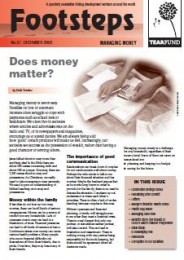Key Indicator 2 – Finance
Finance is a gift from God and He trusts us to be wise stewards. But sadly Finance is renowned for having caused ship-wreck with many ministries; even Christians find the temptations associated with money can become their masters. We must recognise that we have an enemy prowling around looking for people to devour. Handling finance is a spiritual matter, not just administrative. For this reason more will be written about this in due course. Here I will give an overview of the key issues to be aware of.
It is vital to put in place good procedures to ensure full accountability in order to be above reproach and to protect those who handle money from any suspicion. The two most important features are Stewardship and Transparency.
Stewardship
Stewardship is about Faithfulness – ensuring that funds are used effectively and that donor funds are not used for purposes other than that for which they were given. This matter of usage can be counter-cultural in nations where there is a cash economy (i.e. banks, cheques etc not the normal mechanisms) and where the expectation is that if a brother or friend has need you will meet that need if you have cash. The fact that the cash has been donated for another purpose is not considered sufficient reason not to give it away.
To mitigate against this pressure it is wise for donor agencies to consider disbursing grants in tranches which are witheld until they are about to be spent for the designated purpose.
Transparency
The second important feature is Transparency and Accountability. Money is the devil’s playground and accountability is our safeguard. This requires basic elements of ‘good practice’.
There are three distinct aspects to sound financial management:
• Budgeting
• Record-keeping
• Monitoring
Budgets
Good stewardship begins with budgeting, another concept that is foreign in many cultures. The argument is often raised that ‘we do not have enough to budget’.
What is a budget? Budgets help to ‘write your history in advance’ so that you can be confident that the money you will have spent at the end of any given period has been used for the highest priority.
The fact you do not have enough is the very reason why budgeting is particularly important. Why? By this evening – or this time next week – or this time next month- you will have spent some money. Pre-determining priorities (which is what budgeting is about) helps ensure that when cash does become available it is used for the most important purpose.
According to the Bible budgeting can also save you from looking foolish! In teaching about counting the cost of discipleship in Lk 14:28-30 Jesus uses a budgeting analogy about the man who did not give sufficient consideration to the cost of building a tower and then was mocked when he could not complete it.
Record-keeping
Record-keeping is about transparency – nothing is hidden and everything is clearly accountable. It includes recording every transaction in some form – on paper or computer – and adopting such disciplines as obtaining receipts for all transactions. Receipts are an unknown concept in many cash cultures so it may be necessary to create your own for a vendor to sign or mark if he does not supply them. This is just one feature of building a complete ‘trail’ for every transaction.
Monitoring
 Good record keeping leads to the third aspect, Monitoring. Monitoring (which will also be discussed in other Key Indicators eg – Impact) is a powerful financial tool to ensure that finance is being used in the most effective way and is addressing the highest priorities. It also ensures accountability to a donor that funds have been used as intended.
Good record keeping leads to the third aspect, Monitoring. Monitoring (which will also be discussed in other Key Indicators eg – Impact) is a powerful financial tool to ensure that finance is being used in the most effective way and is addressing the highest priorities. It also ensures accountability to a donor that funds have been used as intended.
More will be said on the subject of Finance later but the Tearfund Book 57 in their Footsteps series gives some further practical guidelines for those who would like to do their own investigation.
http://tilz.tearfund.org/webdocs/Tilz/Footsteps/English/FS57.pdf
